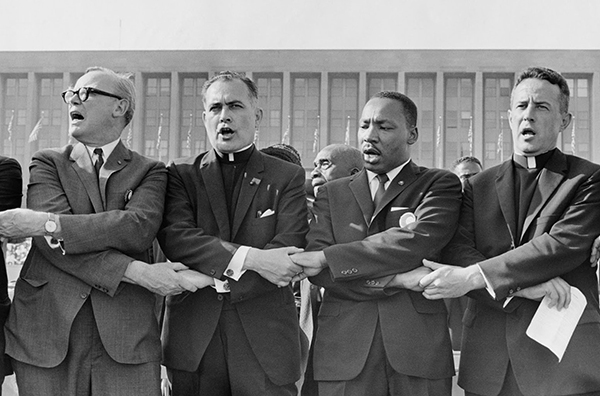
MANHATTAN — Decades ago, Father Theodore Hesburgh sought answers to the issues that plagued the nation through an approach that many people preach is needed to solve the issues of today: He listened. He listened to both sides, in particular to those who were affected most.
In a new book, “Hesburgh of Notre Dame: The Church’s Public Intellectual,” Todd Ream examines the ways Father Hesburgh, who served as the 15th president of the University of Notre Dame from 1952-1987, understood his calling in the priesthood as “one who mediates between God and humanity,” and how that shaped his life.
“We spend a lot of time considering just how fragmented, polarized, divided, the culture is today, but it’s difficult to envision it was more challenging then it was say in the late 1960’s, early 70’s, when (Father Hesburgh) was president and there are discussions going on about matters such as Vietnam, shortly before that civil rights, shortly after that he is invited by President Carter to address immigration challenges,” Ream told The Tablet. “He viewed himself as a mediator through that and I think that’s the most instructive component today that we can see.”
As the book notes, “Father Ted” as Notre Dame students knew him, was first and foremost a priest “who deeply believed in the dignity of all people and their right to a better life.” This commitment was evident in where he focused his energy.
Aside from his role as one of the most influential leaders in higher education, Father Hesburgh served four popes and held sixteen presidential appointments. And was involved in social issues that include civil rights, the peaceful use of atomic energy, campus unrest, the Vietnam War, Third World development and immigration policy reform.
In higher education, he holds a record with 150 honorary degrees. And was awarded the Congressional Gold Medal and the Medal of Freedom. That work he did in the secular world, is where he earned the title of “the church’s public intellectual.”
Ream, who is a professor of higher education at Taylor University, writes that a public intellectual is someone who has a large influence on society through their thought, writing or speaking. He says Father Hesburgh became the church’s public intellectual when he accepted an appointment from President Dwight Eisenhower to serve on the National Science Board.
Ream calls that moment a “significant step” for the administration to bring a Catholic priest, someone in humanities, to be a part of that group.
“It’s not just simply the mechanics of science. The questions of whether or not we could do it, it’s whether or not we should do it and more importantly even to what end we should do it. And when they did that they not only invited Father Ted but they invited a Catholic priest and Catholic theologian into those conversations,” Ream said. “Father Ted’s belief, and mine too to this day is, it’s better to be seated at that table and wrestle with that question, then to not be at the table at all.”
From that point on, though he contributed to nationwide progress on all of the aforementioned issues, his approach to and progress achieved in a particular two — civil rights and immigration policy reform — are notable with how those issues continue to plague the nation today.
With regards to civil rights, Father Hesburgh served on the Civil Rights Commission from its creation in 1957-1972, and chaired it from 1967-1972. In that the commission put together reports and recommendations that led to the Civil Rights Act of 1964, the Voting Rights of 1965 and the Fair Housing Act of 1968.
In that time, Ream notes, what made Father Hesburgh successful was his lack of affiliation with a political party and efforts to fly to southern states “to be present with these people who were facing these challenges as much as possible.”
Both approaches Ream considers missing today.
“Oftentimes we think that we can solve these questions that are plaguing society today by not reaching across the aisle or who are not living amidst these challenges and doing so in spaces they’re living,” Ream said.
“Meeting people where they’re at, listening to their voices where they’re at, and trying to do so with that sort of mindset of a mediator between heaven and earth, between competing views of the good life here on earth, that’s something he took very, very seriously.”
The same can be said for Father Hesburgh’s work on immigration reform, where Ream said he championed the need to see a “broad political and geographic landscape” to have any chance of getting anything done.
Father Hesburgh chaired the Select Commission on Immigration and Refugee Policy from 1979-1981 under President Jimmy Carter. His focus was similar to that of today: Creating pathways to immigration and pathways to alleviate the challenges refugees faced in their home countries.
“I would argue that (immigration reform) is going to take some bipartisan efforts in order to solve these challenges and that’s a huge piece of what is lacking here,” Ream said. “Simply, addressing questions of immigration as either or. Either build a wall or not build a wall, for example, he would see as misguided.”
Ream, who is also a fellow at the Lumen Research Institute and the publisher of Christian Scholar’s Review, was drawn to Father Hesburgh after writing a paper about him at graduate school. Now that it’s been more than six years after his death in February of 2015, Ream decided it was the right time to write something to “remember him in as constructive and useful a way as possible.”
If there’s one thing Ream wants people to take away from Father Hesburgh’s life, it’s to “serve where you’re called to serve and believe that God’s grace is sufficient for you to serve wherever you’re called to serve.”
